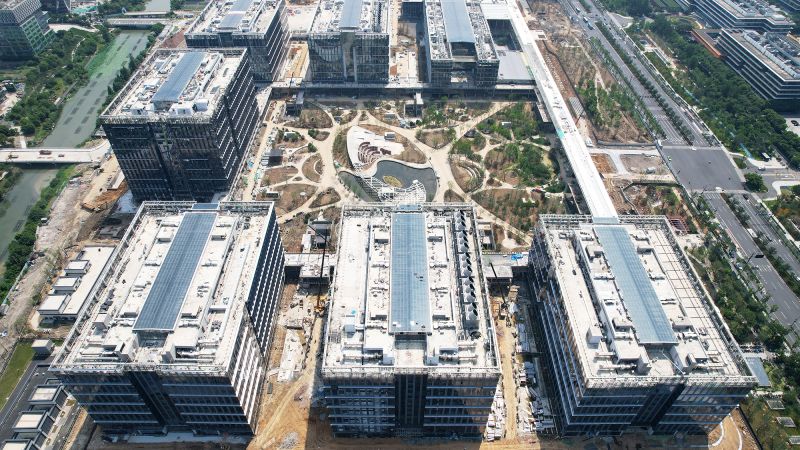Alibaba has called off plans to spin off its cloud computing arm, saying recent tightening of US controls on chip exports to China has created “uncertainties” for the division’s prospects.
The announcement came only hours after crucial talks between Chinese President Xi Jinping and US President Joe Biden appeared to put the often rocky relationship between the world’s top two economies on a steadier footing.
In a statement Thursday, Alibaba (BABA) said the new US restrictions “may materially and adversely” affect the ability of Cloud Intelligence Group to operate, impacting on profitability and casting doubt over the value of a separate listing for shareholders. Alibaba’s US-listed shares fell nearly 10%.
“We will focus on developing a sustainable growth model for Cloud Intelligence Group under the fluid circumstances,” the company said. “These new restrictions may also affect our businesses more generally by limiting our ability to upgrade our technological capabilities.”
Alibaba, which reiterated as recently as September that it planned to list its cloud unit as a separate company, has been forced into the rethink by the escalating chip war between the United States and China.
The two countries have been locked in a year-long feud over China’s access to the most advanced semiconductors, as well as the materials and equipment needed to create the components, used in products ranging from smart phones and medical equipment to electric vehicles.
Last month, the US government further tightened a sweeping set of export controls first introduced a year ago, effectively reducing the range of semiconductors that American companies are able to sell to China.
During talks with Biden Wednesday, Xi described the restrictions as “technological containment.” Biden said in response that the United States is not going to provide technology to China that could be used against it by the Chinese military.
China, for its part, has imposed its own curbs. In August, it limited exports of gallium and germanium, two elements essential to making semiconductors. And days after the announcement of the latest US chip restrictions, Beijing unveiled plans to restrict exports of graphite, a mineral required to make batteries for electric vehicles.
In contrast, far friendlier relations between the two countries were on display this week. Biden called Wednesday’s talks between the leaders “some of the most constructive and productive discussions we’ve had,” saying he and Xi had agreed to pick up the phone and talk during periods of disagreement.
Xi also met with American business leaders in San Francisco Wednesday, telling an audience that included Apple (AAPL) CEO Tim Cook and Tesla (TSLA) CEO Elon Musk that China is willing to be “a partner and a friend.”
He said China and the United States should not engage in a zero-sum game, in which one wins at the expense of the other. “We need to build more bridges and pave more roads for people-to-people exchanges, instead of erecting various obstacles and creating a chilling effect,” Xi said.
His comments came amid a slump in foreign investment in China, which is also grappling with a deepening property crisis and weak consumer spending.
Alibaba, which was founded by billionaire Jack Ma 25 years ago, is in the midst of a historic overhaul that was originally meant to create six separate units, each overseen by its own chief executive and board.
The group said Thursday that it is also pausing plans to list its supermarket chain Freshippo, to “evaluate market conditions.” But it confirmed plans for an IPO of its logistics arm, Cainiao, in Hong Kong, without providing a date for the listing.
Alibaba’s revenues for the June-to-September quarter climbed 9% on the previous year to 224.8 billion renminbi ($31 billion). Net profit was 26.7 billion renminbi ($3.7 billion), compared with a net loss previously, due to an increase in the value of the group’s equity investments.
Read the full article here




